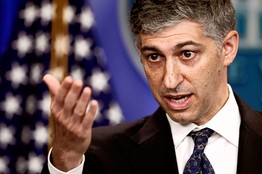Turkey may work with Iran against Kurdish rebels
September 17, 2011 02:01 AM
By Daren Butler
Reuters
ISTANBUL: Prime Minister Tayyip Erdogan has signaled Turkey could launch a joint operation with Iran against Kurdish militants’ main base in northern Iraq, according to reports in Turkish newspapers Friday.
In August, Turkey carried out a series of air and artillery strikes against Kurdistan Workers’ Party (PKK) rebels in northern Iraq and the interior minister said this week a ground operation could be launched any time against the guerrillas there, depending on talks with Iraq.
The military action was triggered by an increase in PKK attacks in southeast Turkey in which dozens of security personnel were killed.
Speaking to reporters while traveling to Tunisia on a north African tour, Erdogan said the minister’s comment had been a slip of the tongue that had been corrected, and that there would be no forewarning of any such operation.
“Things like this are not said, they are done,” the Hurriyet daily quoted the prime minister as saying. The same comments were reported by other newspapers in Turkey.
“The chief of the general staff has completed assessments in the region [southeast Turkey] together with force commanders,” he said.
Speculation about a ground offensive was fuelled when Erdogan met military chiefs before he departed on his trip to North Africa.
When asked in Tunisia about relations with Iran and cooperation against the PKK, Erdogan said: “It’s going well. We may act together at Qandil.”
The Qandil mountains are on the Iraq-Iran border and the main PKK bases are located in those mountains, a part of Iraq’s autonomous Kurdish region around 80-100 km south of the Turkish border.
Kawa Mahmoud, a spokesman for the Kurdish regional government in northern Iraq, told Reuters it did not give Turkey approval for any military operations in its territory.
“No government would accept this … using force would expand the areas of tension and would not serve the interests of the countries,” he said.
Iran, Turkey’s southeastern neighbor, said this month its troops had killed or wounded 30 members of the PJAK (Party of Free Life of Kurdistan), an offshoot of the PKK that is reported to have launched ambushes on the Iranian side of the border.
The Turkish military has said its strikes against the PKK in Iraq in August killed 145 to 160 militants. The PKK has only referred to a few casualties and the figures could not be independently confirmed.
A Turkish diplomat has been in Iraq for talks with the government this week as Ankara seeks more cooperation against the PKK from Iraq, whose large Kurdish minority, concentrated in the north, is politically influential.
Turkey has launched several cross-border air and ground operations in northern Iraq in a conflict that first erupted in the 1980s. The PKK is fighting for greater autonomy and Kurdish rights, having earlier sought a separate state.
More than 40,000 people have died in the conflict and fighting has escalated over this summer.
The last major incursion was in early 2008, when Turkey sent 10,000 troops, backed by air power, into northern Iraq.
Erdogan’s comments also indicated a tougher approach on the Kurdish issue generally after government efforts to negotiate a solution failed to yield a result.
A version of this article appeared in the print edition of The Daily Star on September 17, 2011, on page 8.
via THE DAILY STAR :: News :: Middle East :: Turkey may work with Iran against Kurdish rebels.





![U.S. Envoy to Meet With Iran's Neighbors 5 [USIRAN]](http://sg.wsj.net/public/resources/images/WO-AD021_USIRAN_NS_20101018190047.gif)